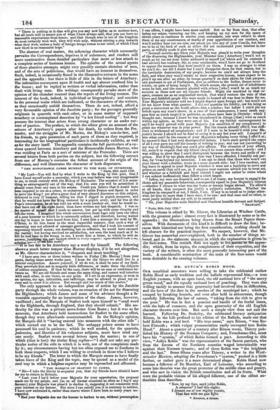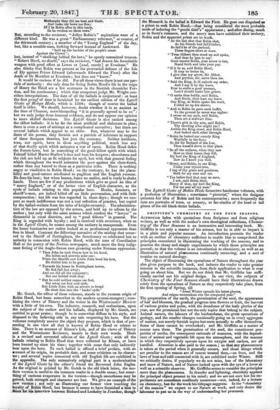MR. GIITCH'S ROBIN HOOD.
Ova uncritical ancestors were willing to take the celebrated outlaw Robin Hood as early tradition and the ballads represented bim,—a true English yeoman, with an open band, the old national love of " the merry green wood," and the equally national love of poaching. They were also willing tacitly to assume that generosity had involved him in difficulties, and the love of the deer in the meshes of the municipal law ; which he escaped by breaking bounds, and ever after held in abhorrence, though carefully following the law of nature, "taking from the rich to give to the poor." He was in fact a poacher and bandit of the feudal times, with the halo of romance, and the open generosity of the old English character thrown over him. But such a simple view does not suit the learned. Following Dr. Stukeley, the celebrated literary antiquarian Ritson, in the Life prefixed to his edition of the Ballads, made out that bold Bobin was a real lord. "His true name," says Ritson, "was Ro- bert Fitzooth ; which vulgar pronunciation easily corrupted into Robin Hood." About a quarter of a century after Ritson wrote, Thierry pub- lished his History of the Norman Conquest; and, Frenchman-like, must have his " system " of which Robin formed a part. According to this view, "Jollye Robin" was the representative of the Saxon patriots, who from the forests of the Northern counties waged interminable war against their Norman tyrants; and of these Robin was " the brightest and the last." Some fifteen years after Thierry, a writer in the West- minster Review, adopting the Frenchman's " system," pushed it a little farther, or rather gave it a more determined shape. Robin Hood now became a follower of De Montfort, Earl of Leicester, who according to some late theories was the great protector of the middle class and gentry,
and who saw in vision the British constitution and all its fruits. What were the probable visions of his alleged follower, one of the oldest au- thorities thus describes.
"Now, by my faye, sayd jollye Robin,
A sweaven• I had this night; I dreamt me of tow wighty yemin, That fast with me gan fight.
* Swearen.• dream. -
Methought they did me beat and blade, And Cooke my Bowe me froe: Iff I be Robin alive in this lande, lle be wroken on them towe."
But, according to the reviewer, "JoIlye Robin's" aspirations were of a different kind. He was a great " Parliamentary reformer," or creator, of the thirteenth century ; a member of the "Young England" of the day, but, like a sensible man, looking forward instead of backward. He
"held up the buckler of the people's cause Against the Crown";
but, instead of " skulking behind the laws," he openly committed treason. " Robert Hood, no doubt," says the reviewer, "had drawn his formidable weapon with good effect at Lewes or [and, surely] at Evesham." He also thinks that Robin was present at the protracted defence of the Isle of Ely against Prince Edward (afterwards Edward the First) after the death of De Montfort at Evesham ; but does not " know."
It would be curious if he did. For all these views there is not one par- ticle of authority : the only data for fixing Robin Hood's life in the reign of Henry the Third are a few sentences in the Scottish chronicler For- dun, and his continuator; which that competent judge Mr. Wright con- siders interpolations. The date of all the ballads is conjectural : at least the. first proof of time is furnished by the earliest edition of the Lytell Geste of Robyn Hode, which is 1508; though of course the ballad itself is older. We should, however, doubt whether it is as ancient as the time of Chaucer, notwithstanding "it is generally agreed to be so" : but we only judge from internal evidence, and do not oppose our opinion to more skilled decisions. The Lytell Geste is also ranked among the oldest ballads: it is by far the most artificial and elaborate in plan; there is even a sort of attempt at a complicated narrative ; but there are several ballads which appear to us older. But, whatever may be the dates of the poems, they furnish not a particle of inference in support of these finespun theories, but just the contrary. Neither incidents, tone, nor spirit, have in them anything political, much less any of that deadly spirit which animates a war of races. Robin Hood defies the Forest-laws, but in something of the good-fellow spirit with which Falstaff killed Master Shallow's deer and beat his keepers; churchmen and the rich are held up as fit subjects for spoil, but with that general feeling which throughout the world animates the poor against the close-fisted, rather than any hatred to them as a particular tribe. There is nothing angry or vindictive in Robin Hood ; on the contrary, he has the placa- bility and good-nature attributed to pugilism and the English yeoman. 'Woes his beat; but when beaten, bears no malice, and is ready to shake hands. There are few if any productions which give so good an idea of " merry England," or of the better view of English character, as the cycle of ballads relating to this popular hero. Monks, foresters, or sheriff's-men, are indeed killed off on little provocation, and with little compunction : but life was less regarded in those days ; though we sus- pect so much indifference was not a real reflection of practice, but copied by the ballad-writers from the tales of knight-errantry. The administra- tors of the law are opposed by the actors, and held up to odium by the author ; but only with the same animus which renders the " lawyer " so distasteful in rural districts, and to "good fellows" in general. The Sing is regarded with loyalty ; and is received with reverence, when as in the Lytell Geste, he comes among the outlaws in masquerade. Even the lesser luminaries are rather looked at as professional opponents than foes in blood. Contrast the following narrative of the mishap that occur- red to the Sheriff of Nottingham, the functionary so celebrated but so unlucky in connexion with Robin Hood, with the tone of Conciliation Hall or the poetry of the Nation newspaper, much more the deep indig- nant feeling of the Anglo-Saxon race groaning under Norman oppression.
" Then John he took Gnyes bow in his hand, His boltes and arrowes eche one: When the Sheriffe saw Little John bend his bow, He fettled him to be gone.
" Towards his house in Nottingham town, He fled full fast away; And soe did all the companye; Not one behind wold stay.
" But he cold neither rune sea fast, Nor away soe fast cold ryde, But Little John with an arrowe so broad He shott him into the backe'-syde."
Mr. Gutch, the editor of these volumes, stands to the yeoman origin of Robin Hood, but leans somewhat to the modern system-mongery ; com- bining the views of Thierry and the writer in the Westminster Review with a little of his own. The industry, research, and enthusiasm, upon the subject of the outlaw and his ballads, displayed by Mr. Gutch, are entitled to great praise; though he is somewhat diffuse in his style, and disposed to the believing side in any tale respecting his hero. But the volumes completely answer the object they propose, which is that of pre- senting in one view all that is known of Robin •Hood or relates to him. There is an account of Ritson's Life, and of the views of Thierry and the Westminster Reviewer, mostly in their own words. There is a revised and corrected edition of the Lytell Geste; with all the ballads relating to Robin Hood that were collected by Ritson, or have been hunted up since his time ; together with some that only indirectly bear upon the hero. To each ballad is affixed a brief preface, with an account of its origin, its probable date, and some criticism on its charac- ter; and several topics connected with old English life are exhibited in the appendix. The only extensively original part is a modernization of the Lytell Geste by the editor's friend the Reverend John Eagles. As the original is printed by Mr. Gutch in the old black letter, the mo- dern version is useful to the common reader in a double sense; but some- thing of raciness evaporates in the version—though smoothness may be gained, both strength and character are lost. We give an example of the new version ; • not only as illustrating our former view touching the loyalty of Robin Hood, but because it seems to have furnished a hint to Scott for his interview between Richard and Loc.kaley in Ivanhoe, though
the Monarch in the ballad is Edward the First. He goes out disguised as a priest to seek Robin Hood,—that being considered the most probable mode of inducing the "gentle thief's" appearance ; and after dining, much as in Scott's romance, and the merry men have exhibited their archery, Robin and the apparent priest set to work.
"At the last shot that Robin shot, As his friends had faird before, So fail'd he of the garland, Three fingers short-or more.
"'Twas Gilbert then stood up and spike, And thus he 'gait to say: Good master Robin, your arrow is lost, Stand forth and take your pay.
"If it be so, said Robin Hood, It may no better be, I give thee my arrow, Sir Abbot, And prythee, Sir, serve thou me.
"Said the Kind, It ill suiteth my order, And I say it by thy leave, Ever to smite a good yeoman, Lest I should make him grieve.
" 0 smite thee boldly, said Robin, And freely, thou bast my leave. Our King, as Robin spoke the word, Folded he up his sleeve;
"And to Robin he gave such buffet,
To the ground he never was nigher: I swear on my oath, said Robin, Thou art a stalwart friar.
"There's pith in thy arm, said Robin, Thy shooting a foe might rue! Awhile the King stood, and Robin Hood, And looked each other through.
"Robin he looked our comely King Wistfully in the face; So did Sir Richard of the Lee, Then kneed down in that place.
"So all the outlaws, when they saw How on their knees they fell, My lord the King of England, Now do I know you welL "Mercy, said Robin, to our King, Under your trystel tree, I beg of thy grace and goodness, Both for my men and me.
"Yea before God that may us save, I ask, said Robin then, Mercy of thee, my lord the King, For me and all my men."
The Lyttell Geste of Robin Hodc forma two handsome volumes, with
a profusion of illustration ; sometimes " pictorial," where the designer
presents his idea of Robin and his contemporaries ; more frequently the
cuts are portraits of trees, or scenery, or fac-similes of the head or tail pieces of the old black-letter ballads.



























 Previous page
Previous page